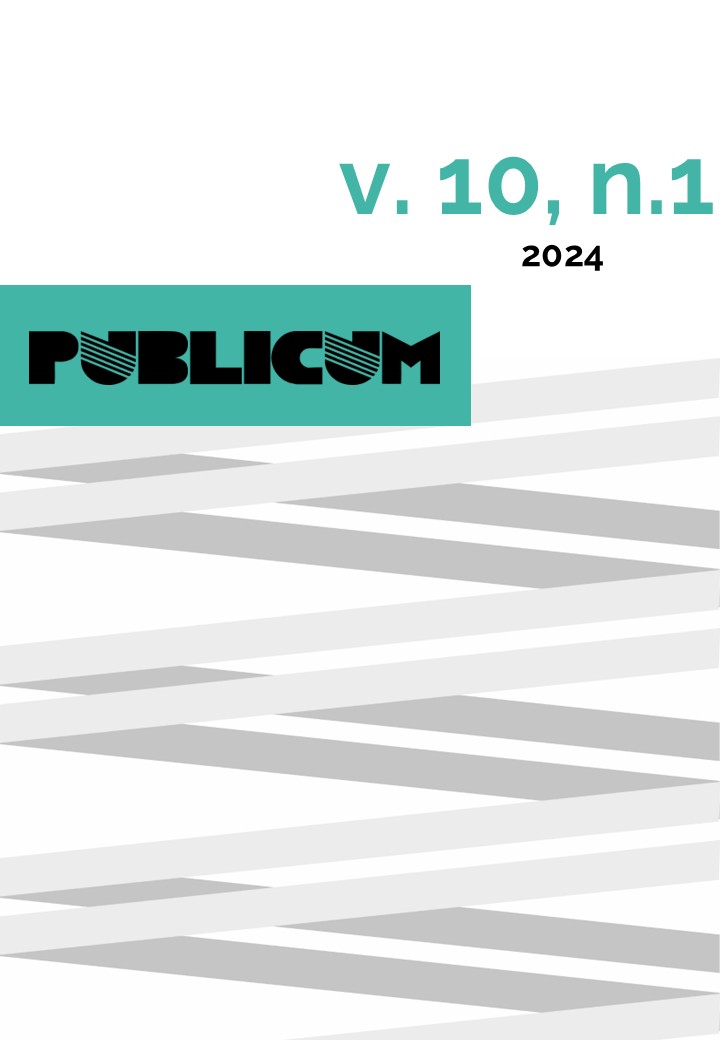A competência legislativa concorrente em matéria ambiental
Ambiguidades interpretativas da jurisprudência do STF e o papel da legislação federal como standard protetivo mínimo
DOI:
https://doi.org/10.12957/publicum.2024.87971Parole chiave:
direito ambiental, competência concorrente, federalismo, jurisdição constitucionalAbstract
O artigo trata das dificuldades da interpretação e da aplicação das competências legislativas concorrentes estabelecidas na Constituição Federal de 1988, particularmente em matéria de direito ambiental. Verifica-se, na prática, a hipertrofia da normatividade federal em detrimento do espaço de suplementação do legislador estadual. Ao mesmo tempo, as ambiguidades semânticas e a polissemia do texto constitucional não ajudam o intérprete a traçar uma linha segura entre a normatividade federal e a suplementação local. Nota-se, quanto à proteção ao meio ambiente, na jurisprudência do Supremo Tribunal Federal, certa ambiguidade interpretativa, ora pendendo em favor da competência federal, ora assegurando o espaço do legislador estadual. Enxerga-se, porém, com frequência a legislação federal como um standard protetivo mínimo de onde não se admite ao legislador local retroceder. Diante da centralidade da agenda ambiental, seria desejável buscar parâmetros jurisprudenciais mais sólidos, incentivando-se o avanço de um efetivo federalismo cooperativo ecológico
Riferimenti bibliografici
BESSA ANTUNES, Paulo de. Federalismo e competências ambientais no Brasil. São Paulo: Editora Atlas S.A., 2ª Edição, 2015.
CAMPANHOLE, Adriano; CAMPANHOLE, Hilton Lobo (Orgs.) Constituições do Brasil (compilação e atualização dos textos, notas, revisão e índices). 13. ed. São Paulo: Atlas, 1999.
COELHO, Luiz Fernando. A competência concorrente em matéria ambiental. Revista de Informação Legislativa, v. 29, n. 114, p. 63-72, abr.-jun. 1992.
FERRAZ JUNIOR, Tercio Sampaio. Normas gerais e competência concorrente: uma exegese do art. 24 da Constituição Federal. Revista Trimestral de Direito Público, n. 7, p. 16-20, 1994.
LOBO, Paulo Luiz Neto. Competência legislativa concorrente dos Estados-membros na Constituição de 1988. Revista de Informação Legislativa, v. 26, n. 101, p. 87-104, jan.-mar. 1989.
MOREIRA NETO, Diogo de Figueiredo. Competência concorrente limitada: o problema da conceituação das normas gerais. Revista de Informação Legislativa, v. 25, n. 100, p. 126-162, out.-dez. 1988.
PIRES, Thiago Magalhães. As Competências Legislativas na Constituição de 1988. Belo Horizonte: Fórum, 2015.
___________________________. Federalismo, flexibilidade e assimetria no direito brasileiro: agrupamentos municipais, convênios de cooperação e consórcios públicos. Revista de Direito Administrativo, Rio de Janeiro, v. 275, p. 125-154, maio/ago. 2017.
___________________________. O poder constituinte decorrente no Brasil: entre a Constituição e o Supremo Tribunal Federal. A&C – Revista de Direito Administrativo e Constitucional, Belo Horizonte, ano 18, n. 71, p. 295-314, jan./mar. 2018.
___________________________. Federalismo para quem? Um balanço aos 30 anos da Constituição de 1988. Revista Publicum: Rio de Janeiro, v. 4, Edição Comemorativa, 2018, p. 63-84.
SARLET, Ingo Wolfgang; FENSTERSEIFER, Tiago. STF e a solução de conflitos de competências legislativas em matéria ambiental. Acessível em: https://www.conjur.com.br/2020-jan-17/direitos-fundamentais-stf-conflitos-competencia-legislar-materia-ambiental?pagina=3
___________________________________________. Curso de direito ambiental. Rio de Janeiro: Editora Forense, 3ª Edição, 2022.
TOSTA, André Ribeiro. Instituições e o direito público: empirismo, inovação e um roteiro de análise. Rio de Janeiro: Lumen Juris, 1ª Edição, 2019.
Downloads
Pubblicato
Come citare
Fascicolo
Sezione
Licenza
Copyright (c) 2025 Patricia Ferreira Baptista, Leonardo Antoun

Questo lavoro è fornito con la licenza Creative Commons Attribuzione - Non commerciale 4.0 Internazionale.
O autor do trabalho declara conhecer e concordar com as regras a seguir:
1) Realizou o trabalho apresentado à revista, sendo inteiramente responsável pelas ideias e conceitos nele emitidos, que não correspondem, necessariamente, ao ponto de vista dos Editores de Publicum.
2) Obedeceu, na realização do trabalho, os princípios éticos aludidos na política de avaliação da revista[RDN1] .
3) Assume a autoria e a responsabilidade pela obra, declarando que ela não infringe quaisquer direitos de propriedade intelectual de terceiros.
4) Responsabiliza-se, integralmente, por danos de natureza moral ou patrimonial que a veiculação da obra venha a gerar a terceiros.
5) Cede à revista os direitos de reprodução, edição e primeira publicação do trabalho em qualquer meio midiático, em particular sob forma digital, em arquivo eletrônico online na internet.
6) Confere aos Editores o direito de modificar o texto apresentado, sem prejuízo de seu conteúdo, quando necessário para uniformizar a apresentação dos trabalhos e para atender as normas de edição próprias da revista.
7) Concorda com a forma final do trabalho aprovada pela revista.
8) Autoriza a divulgação do trabalho nos canais de comunicação da Faculdade de Direito da UERJ.
9) Concorda com a reprodução de pequenos trechos do trabalho em outras publicações da UERJ.
10) Reconhece que, pela cessão e autorizações acima referidas, não receberá remuneração sob qualquer modalidade, tendo estas o caráter de colaboração científica.
11) Tem ciência de que a publicação do trabalho poderá ser recusada caso não considerada conveniente, por qualquer motivo que seja, sendo que tal recusa não gera responsabilidade e/ou ônus de espécie alguma à revista ou UERJ.
[RDN1]Ver COPE.

Publicum está licenciado com uma Licença Creative Commons Atribuição-NãoComercial 4.0 Internacional.

